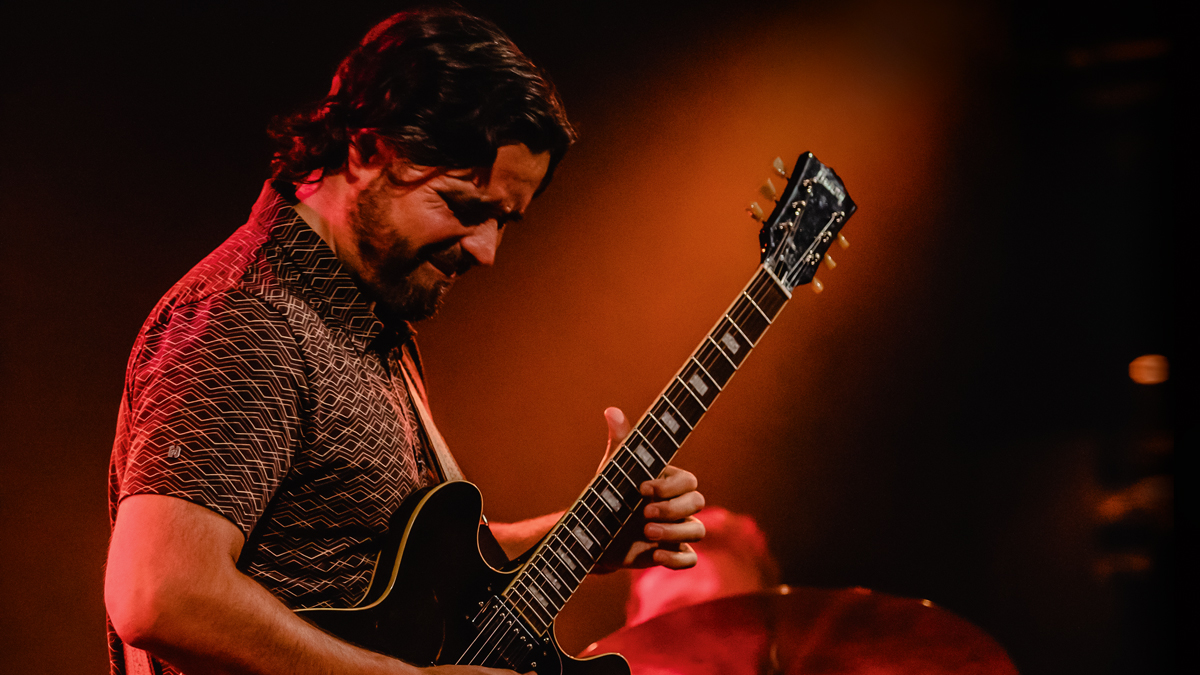“I tend to think if you wouldn’t sing it, don’t play it”: Session player turned Mamas Gun guitar slinger Terry Lewis on the enduring majesty of the 335 semi-hollow and what he learned from Larry Carlton
A formidable session guitarist and teacher at BIMM, Terry Lewis is the virtuoso presence behind London neo-soul quintet Mamas Gun

Taking the sound of classic soul to audiences across the world, London-based quintet Mamas Gun take inspiration from Marvin Gaye and Curtis Mayfield into a sound that is very much their own.
And for guitarist Terry Lewis – who works as a teacher for guitar schools BIMM and WaterBear, and has played for Lisa Stansfield, Beverley Knight and Sandi Thom – it’s a fun way of experimenting with rich chord progressions, laid-back grooves and what he lovingly refers to as “many layers” of tape saturation and spring reverb.
“As a jobbing player I’ve always wanted to be versatile, and have owned all kinds of instruments, though I tend to stick with 335-style guitars,” he says. “You can play any kind of music on them, though when it comes to soul/funk/jazz stuff, they are perfect.”
His main workhorses right now are a Gibson Custom Shop ’64 reissue and a cherry red Lucille from 1998 which he describes as his “absolute baby” because it sounds “so thick and characterful”.
Travelling abroad with such valuable guitars can be daunting, so there’s also a fly rig consisting of a modern Chinese-made Epiphone Riviera with mini humbuckers (“great for ’60s-style twang”) and a Burny ’70s-style 335 copy.
These are usually fed into a Dumble-inspired Fuchs ODS 30 via his Hermida Zendrive, Chase Bliss Wombtone phaser, Empress tremolo and Strymon El Capistan delay. He says he’s still on the search for his perfect fuzz, but right now the JHS 3 Series ticks all the right boxes.
If you listen to any of Terry’s lead work in Mamas Gun, you will probably detect an influence from American jazz legend Larry Carlton. So what advice can he offer those of us hoping to sound a little more like Mr. 335?
Get The Pick Newsletter
All the latest guitar news, interviews, lessons, reviews, deals and more, direct to your inbox!
“I think the important things would be to work on dynamic control, harmonic vocabulary, phrasing and timing,” he reveals. “Larry knows all about note choice and how to superimpose triads over different chords. But most importantly he always plays a great phrase. That’s true of all my favourite players. I tend to think if you wouldn’t sing it, don’t play it.”
And as he rightfully points out, it’s best to learn from a wide pool of influences. “You don’t want to end up sounding like a second-rate version of someone else,” he says. “It’s better to take little bits from a range of players and hopefully discover what you are about along the way.”
- Mamas Gun at PizzaExpress – Live in London is out now via PX Records.
Amit has been writing for titles like Total Guitar, MusicRadar and Guitar World for over a decade and counts Richie Kotzen, Guthrie Govan and Jeff Beck among his primary influences as a guitar player. He's worked for magazines like Kerrang!, Metal Hammer, Classic Rock, Prog, Record Collector, Planet Rock, Rhythm and Bass Player, as well as newspapers like Metro and The Independent, interviewing everyone from Ozzy Osbourne and Lemmy to Slash and Jimmy Page, and once even traded solos with a member of Slayer on a track released internationally. As a session guitarist, he's played alongside members of Judas Priest and Uriah Heep in London ensemble Metalworks, as well as handled lead guitars for legends like Glen Matlock (Sex Pistols, The Faces) and Stu Hamm (Steve Vai, Joe Satriani, G3).
“I heard the Money solo and thought, ‘This is amazing!’ So I sent David a telegram saying, ‘Remember me? I'm in a band now called Roxy Music’”: Phil Manzanera on his friendship with David Gilmour, and the key to the Pink Floyd man's unmistakable tone
“It’s really quite genius, but also hard to learn – it sounds insane, but sometimes the easiest songs still get me nervous”: Kiki Wong reveals the Smashing Pumpkins song she had the most trouble with












